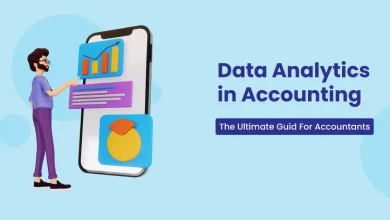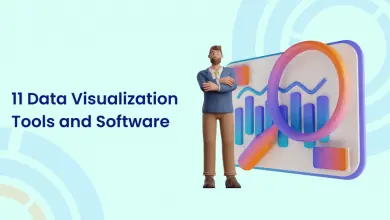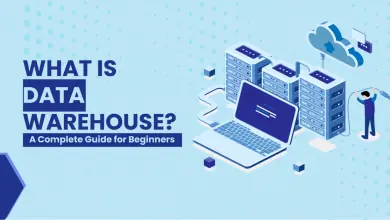What is Snowflake? The Ultimate Guide to Data Cloud Platform
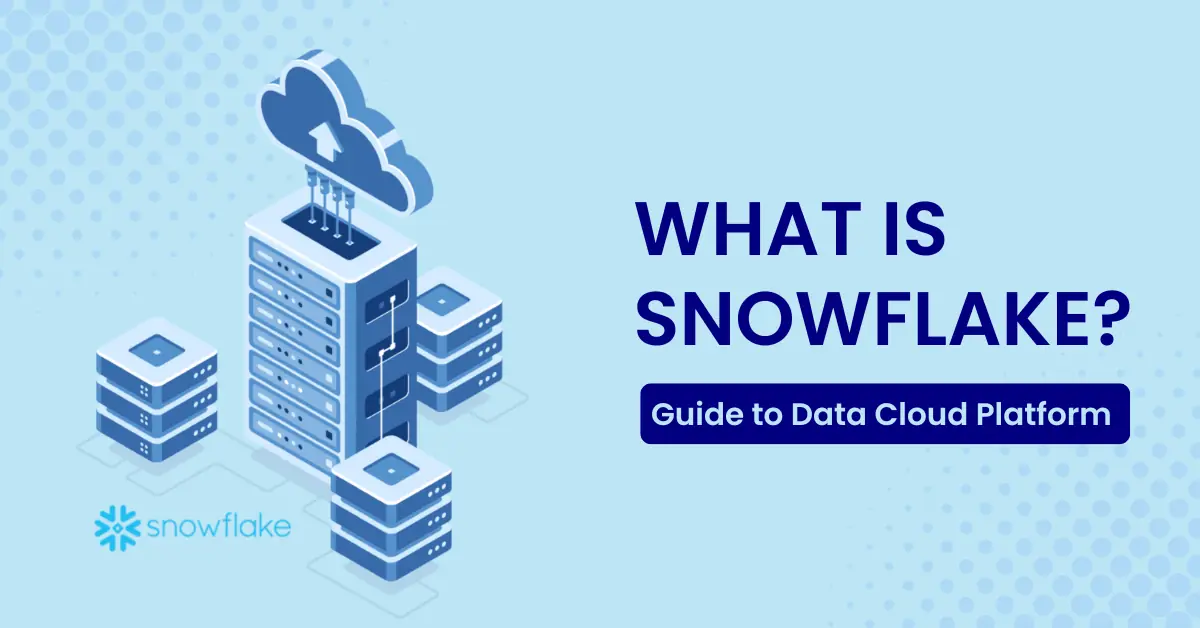
It’s no surprise that Snowflake is a highly-recommended data warehouse solution. Its popularity is well deserved, thanks to its ease of use, powerful features, and its prolific benefits.
A snowflake is a great tool for businesses of all sizes, but it’s especially useful if you’re new to data warehousing. In this blog, we will be rounding up the most important things about Snowflake. Let’s first understand what a snowflake is.
What is Snowflake?
Snowflake is a data platform that allows companies to store and analyze their customer data. It’s not just an analytics tool, it’s also a good fit for enterprises that need to store massive amounts of data in a single place.
Snowflake is more than just another database; it’s an end-to-end solution for storing and analyzing your digital information. It combines all the necessary components for you to run your business at scale: ingestion, processing, security, governance, and collaboration. In other words, it’s a complete solution for managing big data processing needs.
Top Features of Snowflake

Snowflake offers a new way to store and manage your data and it’s changing the game. While many companies have worked to improve their data storage solutions, Snowflake stands out from the rest with its unique features.
1. Data ingestion
You can import data from almost any source without having to worry about writing code or configuring schemas. This makes it easy to get started with Snowflake you don’t have to worry about learning new software or waiting for your IT team to set things up.
2. Query optimization
Snowflake uses machine learning algorithms to optimize queries based on the type of workload they’re being used for (e.g., OLTP vs OLAP). This means that queries run faster and more efficiently than they would if they were run on other databases.
3. Cost-effective storage
Because there’s no need for manual setup or configuration, you can store more data at lower costs compared to other cloud solutions like Amazon Redshift or Google BigQuery.
Top Benefits of Using Snowflake Cloud Data Warehouse
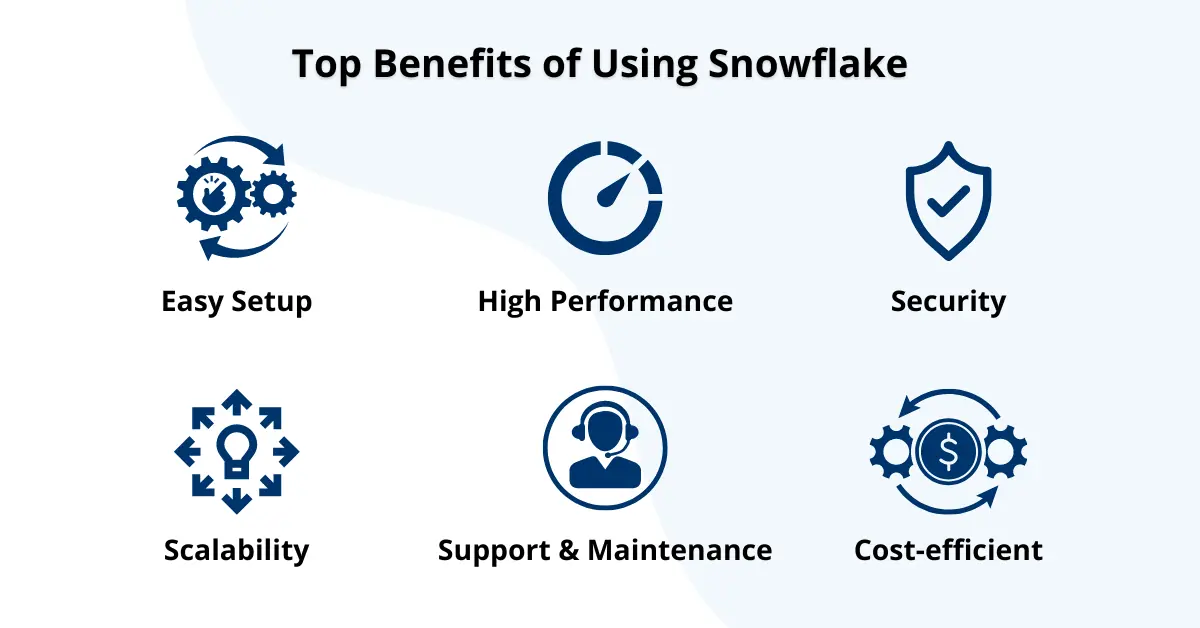
It’s an easy way to store your data and run analytics on it, but there are other benefits as well. Here are 6 reasons why you should consider using Snowflake for the cloud data warehouse.
1. Easy Setup
The Snowflake Cloud Data Warehouse is super simple to get started with, and you can be up and running in no time at all.
2. High Performance
Not only does the Snowflake Cloud Data Warehouse handle large amounts of data efficiently, but it also provides real-time insights into your data.
3. Security
The Snowflake Cloud Data Warehouse was designed to be secure from day 1 and we’re constantly upgrading our security measures to keep up with the latest threats and ensure your information stays safe.
4. Scalability
Snowflake Cloud Data Warehouse is scalable, so your data warehouse can grow as your business grows. You don’t have to worry about running out of space or having to upgrade your hardware. we’ll automatically add more servers as needed.
5. Support & Maintenance
Snowflake Cloud Data Warehouse provides 24/7 support from our team of experts who will be there for you whenever you need them. Our goal is 100% uptime for every customer using our product, which means we’re always working hard behind the scenes to make sure that the experience is flawless for everyone involved!
6. Cost-efficient
Snowflake Cloud Data Warehouse is fully-managed, which means you don’t have to worry about the operational aspects of maintaining your data warehouse. It’s a one-time fee that gives you access to all the tools you need to get started, and we’ll handle everything else.
Read More: What is a Data Warehouse? A Complete Guide
What Does Snowflake Do?
Snowflake is a new data warehouse, built on top of AWS’s cloud services. It helps companies collect and manage large amounts of data, and it makes it easy to analyze that data, too. Snowflake lets you store your data in one place so you can run reports and analytics on it, rather than having to pull from multiple sources.
It also allows you to do this without needing to hire an army of data scientists or IT experts. it does all the heavy lifting for you. So how does Snowflake work?
Well, it’s pretty simple. You store your raw data in Snowflake tables and then use SQL queries to get at that data. If you want more information about a specific salesperson or product line or whatever else might be relevant for your business, all you need to do is ask Snowflake for it.
And if you’ve got multiple people working on different aspects of your business like marketing or sales or accounting they can all access the same data and work together seamlessly with no hassle at all!
Snowflake Architecture
Snowflake architecture is a data warehouse design pattern that emphasizes scalability and flexibility. It’s not a new term, but it has become more popular recently as companies realize the value of data warehouses in making strategic decisions about their businesses.
The name comes from the snowflake-like nature of each table in the database. In contrast to normalized databases, snowflake databases are characterized by their high degree of normalization and use of denormalized tables.
- It allows the database layer of your app to be decoupled from the business logic layer so that you can rapidly scale up or down depending on how much data you need to process.
- You can have one central data warehouse rather than many smaller ones. The data in your warehouse will be organized into tables, which are then grouped into schemas.
- Each schema includes a table for each type of object (users, products, orders) as well as one for all the relationships between those objects.
- Snowflake architecture lets you add new features or modify existing ones without causing errors or creating inconsistencies in your data.
- It allows developers to test their changes before they go into production because they don’t have to worry about messing up any other part of the system (since everything has already been separated).
Snowflake’s Pricing Model
Pricing is an important part of any business, but it can be especially difficult for startups that are just starting.
This is especially true if you’re a SaaS company because you’re selling a product that your customers may not be able to purchase until they have a working relationship with you. That’s where Snowflake comes in!
We’ve created a pricing model that allows you to start building your customer base while also making sure that your revenue targets are met.
Our plan is simple: we charge customers based on the number of users they have on board with our platform, and then we offer them a discount if they sign up for our annual contract.
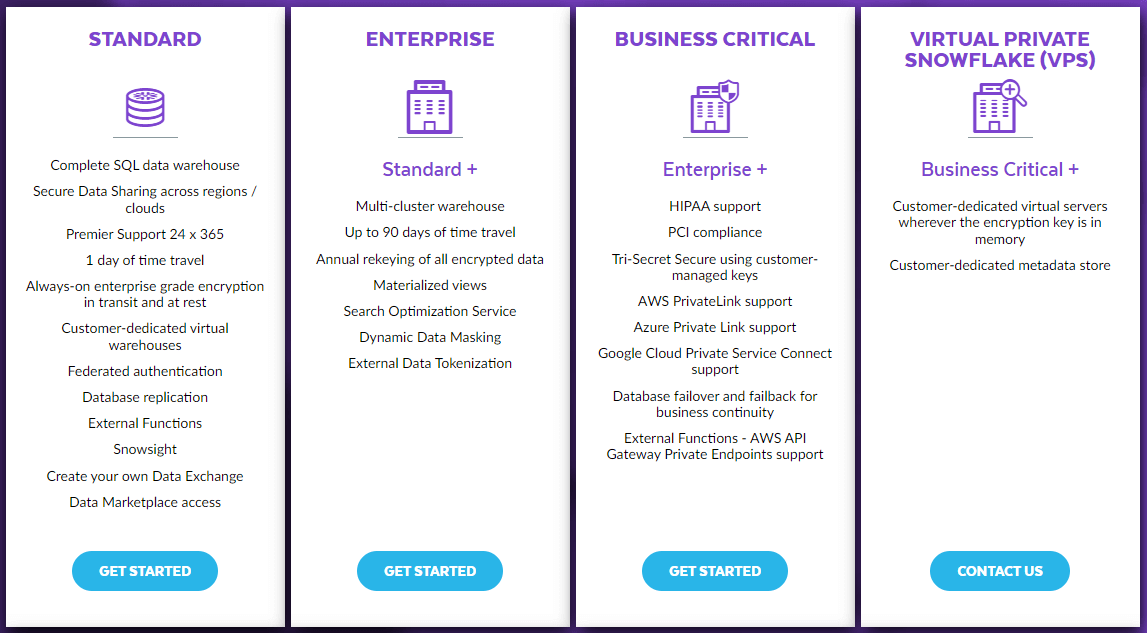
This way, we don’t lose sight of what matters most providing our clients with the best solutions available on the market today!
Snowflake’s pricing model is based on the amount of data you’re using. There are three tiers.
1. Snowflake Lite
This is a free option, but it only offers a maximum of 5 GB per month. You can only use 2 replicas and have no access to premium features like high availability or disaster recovery.
2. Snowflake Standard
This plan offers 50 GB per month and 8 replicas for $20 per month. You also get access to premium features like high availability and disaster recovery.
3. Snowflake Enterprise
This plan offers 500 GB per month and 16 replicas for $2,000 per month. It also includes all the features offered by Snowflake Standard and more advanced features like multi-region support and encryption at rest.
Future of Snowflake
The future of Snowflake is to be a big data platform. It will support other big data tools and applications, including Data Analytics, Data Warehousing, and Data Visualisation. The future includes an open source version called Apache Spark that can run on both Windows and Linux servers.
The new version also supports Apache Parquet, which is a columnar storage format for analytics that works with Apache Spark and other data processing systems. Businesses need to have access to the right tools so they can make informed decisions about their business.
The new version of Snowflake allows users to analyze their data using SQL code or Python scripts, which makes it easier for them to use the software without having to learn new programming languages or skill sets like Java or Scala.
This is especially helpful if they don’t have any technical knowledge or experience working with those types of languages before now!

Ending Thoughts
We hope you enjoyed reading this guide as much as we enjoyed writing it. Snowflake is an incredible data cloud platform that can help you manage your data in a way that fits your needs, and we are excited to see how you use it in your company.
We’d love to help you get started with Snowflake and make sure that your business is ready for the next generation of data management.
FAQs on Snowflake & Data Cloud Platform
Snowflake is a cloud-based data warehouse and analytics platform that lets you store, manage, and analyze all your data in one place. It’s ideal for companies that need to scale quickly, or for those that have multiple teams processing data at the same time.
The Snowflake Data Warehouse Platform provides an enterprise-grade solution for managing and analyzing large volumes of data at high speed and scale. The platform includes:
Data Warehouse: Fast, scalable analytics at high volume with no limits on data size or types of tables.
Analytics: Powerful tools for creating custom reports and visualizations on data stored in Snowflake.
Data Catalogue: A centralized repository of metadata about your data stored in the warehouse that enables easy access to all your information.
The Data Cloud Platform is a set of features that let you easily manage your database administration tasks in a single location. This tool helps you manage the full lifecycle of your databases, including provisioning and de-provisioning, monitoring performance and health, and scaling up or down as needed.
The best way to get started with Snowflake is to download the software and install it on your local machine. You can also get started by signing up for a trial account.
Snowflake & Data Cloud Platform is an all-in-one data warehouse, cloud data warehouse, and data lake platform that provides analytics and data science teams with the power to store, manage and analyze all their data in one place.
Snowflake is built for enterprise-grade scalability and performance, so you can manage all your data in one place without worrying about cost or performance constraints.
With Snowflake’s powerful machine learning algorithms you can easily find patterns in your data, identify trends, and automate processes by turning raw data into actionable insights.
1. It’s secure: Our data centers are designed with security in mind, and we have multiple layers of protection to ensure your data stays safe.
2. It’s flexible: Our platform is built to be adaptable to your specific needs, so you can use it however you want—from big-data analytics to machine learning and artificial intelligence.
3. It’s scalable: No matter what size your business grows, our platform will grow with you, so there’s no need to worry about buying more hardware or hiring more people just to handle the increased load of your growing enterprise!
Data protection is a top priority for us. We take great care to ensure that your data and privacy are safe, and we do this by:
Using encryption: All of your data is encrypted before it leaves your computer or mobile device and while it’s in transit. And once it reaches our servers, it’s stored in an encrypted form so only you can access it.
Limiting access to only those people who need it. You can choose whether or not to share your data with people who have access to the Snowflake platform.
Auditing the system regularly for unauthorized activity.
Yes! Snowflake works with structured, semi-structured, or unstructured data—including JSON documents, images, video files, audio clips, and more.
You can store all types of enterprise-grade data, including structured, semi-structured, and unstructured. You can also store big datasets—Snowflake’s infrastructure is designed to scale to handle your biggest data challenges.
With Snowflake, you can start small and grow big without having to worry about whether your database will be able to handle it all. With our unique architecture and intelligent software, we’ve made sure that we can handle even the most complex workloads without requiring any changes from you or your team!



